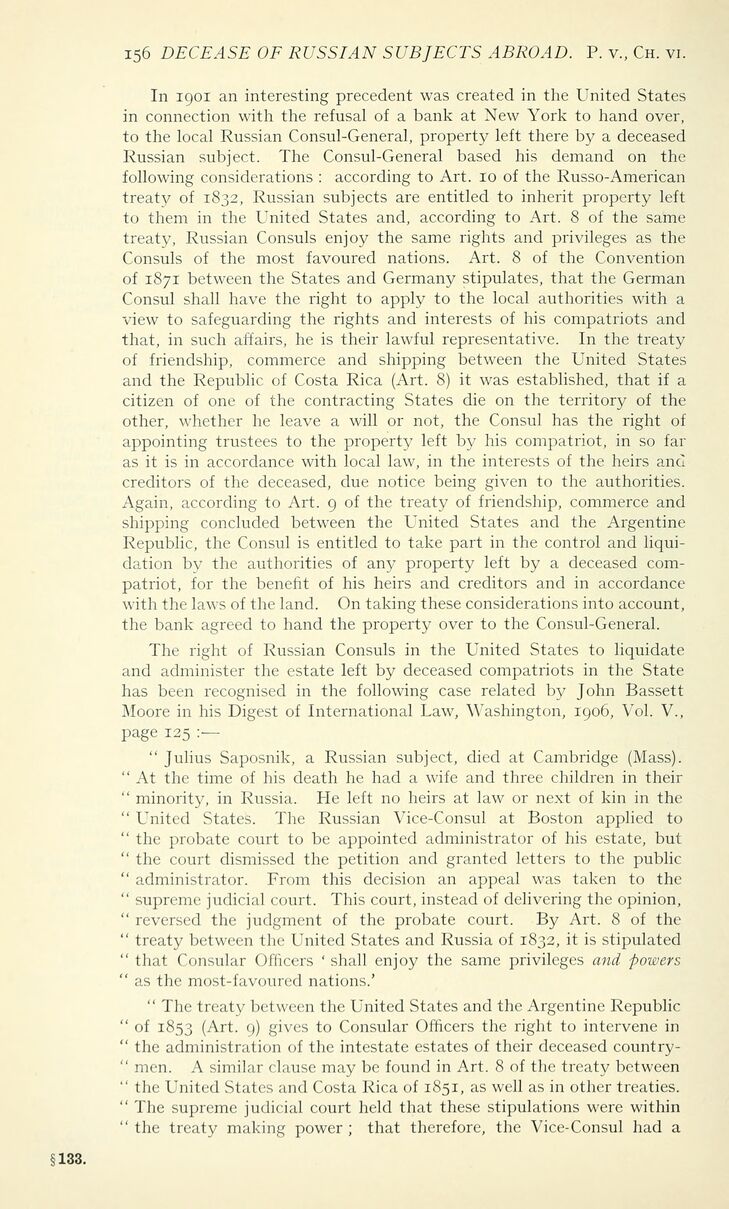
Full resolution (JPEG) - On this page / på denna sida - Pages ...

<< prev. page << föreg. sida << >> nästa sida >> next page >>
Below is the raw OCR text
from the above scanned image.
Do you see an error? Proofread the page now!
Här nedan syns maskintolkade texten från faksimilbilden ovan.
Ser du något fel? Korrekturläs sidan nu!
This page has never been proofread. / Denna sida har aldrig korrekturlästs.
156 DECEASE OF RUSSIAN SUBJECTS ABROAD. P. v., Сн. vi.
In 1901 an interesting precedent was created in the United States
in connection with the refusal of a bank at New York to hand over,
to the local Russian Consul-General, property left there by a deceased
Russian subject. The Consul-General based his demand on the
following considerations : according to Art. 10 of the Russo-American
treaty of 1832, Russian subjects are entitled to inherit property left
to them in the United States and, according to Art. 8 of the same
treaty, Russian Consuls enjoy the same rights and privileges as the
Consuls of the most favoured nations. Art. 8 of the Convention
of 1871 between the States and Germany stipulates, that the German
Consul shall have the right to apply to the local authorities with a
view to safeguarding the rights and interests of his compatriots and
that, in such affairs, he is their lawful representative. In the treaty
of friendship, commerce and shipping between the United States
and the Republic of Costa Rica (Art. 8) it was established, that if a
citizen of one of the contracting States die on the territory of the
other, whether he leave a will or not, the Consul has the right of
appointing trustees to the property left by his compatriot, in so far
as it is in accordance with local law, in the interests of the heirs and
creditors of the deceased, due notice being given to the authorities.
Again, according to Art. 9 of the treaty of friendship, commerce and
shipping concluded between the United States and the Argentine
Republic, the Consul is entitled to take part in the control and
liquidation by the authorities of any property left by a deceased
compatriot, for the benefit of his heirs and creditors and in accordance
with the laws of the land. On taking these considerations into account,
the bank agreed to hand the property over to the Consul-General.
The right of Russian Consuls in the United States to liquidate
and administer the estate left by deceased compatriots in the State
has been recognised in the following case related by John Bassett
Moore in his Digest of International Law, Washington, 1906, Vol. V.,
page 125 :—
" Julius Saposnik, a Russian subject, died at Cambridge (Mass).
" At the time of his death he had a wife and three children in their
" minority, in Russia. He left no heirs at law or next of kin in the
" United States. The Russian Vice-Consul at Boston applied to
" the probate court to be appointed administrator of his estate, but
" the court dismissed the petition and granted letters to the public
" administrator. From this decision an appeal was taken to the
" supreme judicial court. This court, instead of delivering the opinion,
" reversed the judgment of the probate court. By Art. 8 of the
" treaty between the United States and Russia of 1832, it is stipulated
" that Consular Officers ’ shall enjoy the same privileges and powers
" as the most-favoured nations.’
" The treaty between the United States and the Argentine Republic
" of 1853 (Art. 9) gives to Consular Officers the right to intervene in
" the administration of the intestate estates of their deceased
country-" men. A similar clause may be found in Art. 8 of the treaty between
" the United States and Costa Rica of 1851, as well as in other treaties.
" The supreme judicial court held that these stipulations were within
" the treaty making power ; that therefore, the Vice-Consul had a
§133.
<< prev. page << föreg. sida << >> nästa sida >> next page >>